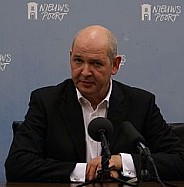After the election, every party's opinion about who should govern must be heard
After the election, every party's opinion about who should govern must be heard
“An authoritative person should take look at how the different parties see the election result,” SP leader Jan Marijnissen told journalists gathered at the national press centre in Nieuwspoort on Friday. Someone should be found who is respected on all sides and this person should spend a few days listening to each parliamentary group, finding out which parts of their own programmes they see as open to negotiation and what coalition of parties they would prefer to see taking part in the first round of talks aimed at forming a government.
In most parliamentary democracies – certainly in the English-speaking world – it is clear as soon as the votes are counted which party or parties will be in government and which in opposition. In the Netherlands, however, a strictly proportional system and a plethora of political parties mean that things are rarely that straightforward. It can take weeks for two or more parties to agree to form a coalition capable of commanding majority support in parliament, and this time things are even more complicated than usual. None of the obvious combinations of the right (Christian Democrats/right-wing market liberals), centre (Christian Democrats/Social Democrats), or left (SP, Social Democrats, Greens) can muster the necessary total of seventy-six seats. Talks are therefore likely to be protracted.
 For Jan Marijnissen, the message from the voters is clear: they want to see a much more positive, progressive approach to social policy. The governing parties lost between them nine seats, while parties favouring a positive social policy together gained nine. Prime Minister and Christian Democrat (CDA) leader Jan-Peter Balkenende claimed that the relatively small losses suffered by his party, and the fact that it remains by some distance the biggest parliamentary bloc, can be taken as an endorsement.
For Jan Marijnissen, the message from the voters is clear: they want to see a much more positive, progressive approach to social policy. The governing parties lost between them nine seats, while parties favouring a positive social policy together gained nine. Prime Minister and Christian Democrat (CDA) leader Jan-Peter Balkenende claimed that the relatively small losses suffered by his party, and the fact that it remains by some distance the biggest parliamentary bloc, can be taken as an endorsement.
Jan Marijnissen disagrees. “If the CDA is saying that it's starting position for negotiations is that it wants to continue with the present cabinet's policies, things are going to be difficult,” he says.
According to the SP leader, stopping 'market-working' in the health care sector, and the recent 500 million euro sweetener to industry, money which could have been much better spent elsewhere, are the priorities. In addition, the party wants to see unnecessary defence spending, in particular the purchase from the US of a new fighter plane (the JSF) reallocated, and a major change of direction as regards Iraq and Afghanistan.
Marijnissen does not rule out participating in government with the CDA, but is pessimistic about the chances of a compromise being found which would be acceptable to his party. Nevertheless, as the third party and the one which last Wednesday made the biggest electoral gains, the SP accepts that it has a responsibility to talk. “I shall enter the discussions in a positive spirit and see what comes of them,” he promised.
Earlier in the day, Jan Marijnissen had – in common with other leaders of parliamentary groups, and in keeping with traditional practice following an election in the Netherlands – been to the royal palace to deliver his advice to the head of state.
Marijnissen told Queen Beatrix that the CDA's claim to have won the electorate's endorsement was untenable, and that what was significant was the increase in the overall vote for the three centre-left parties and the Christian Union, which has also criticised the government's neoliberal approach to a range of social policies. Given the electorate's mixed message, someone must be appointed to look into the possibilities before the actual negotiations begin.
